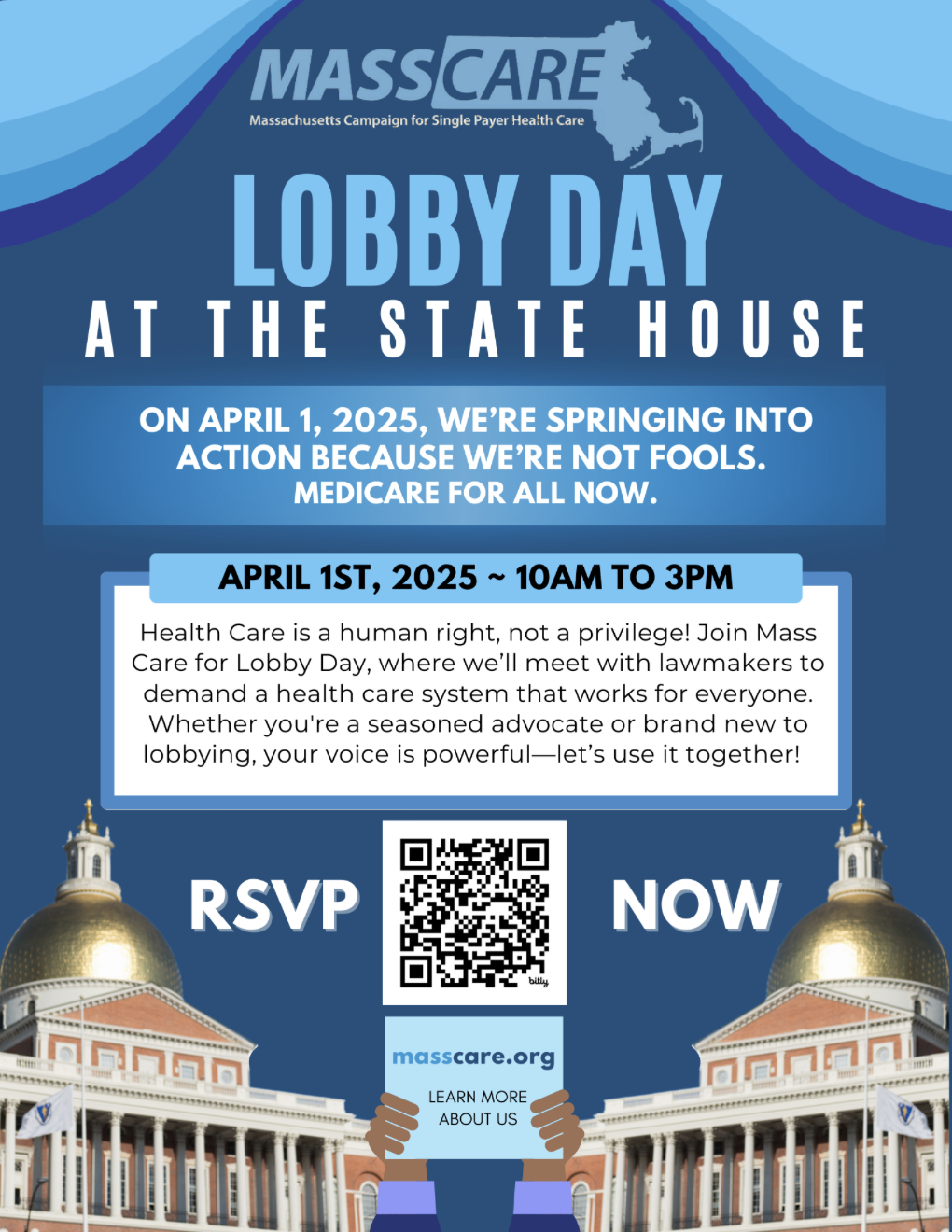Happy Saturday,
With all the talk around rules, some transparency victories in the bag, and the new session finally kicking off, you might be wondering: what’s next for Act on Mass?
Well, we'll be sticking around here in your inbox, delivering the Saturday Scoop with news from Beacon Hill each week. We're hosting a transparency action hour for Sunshine Week with allies next Tuesday. We’re also gearing up to launch our second ever legislative campaign, targeting our two key main priorities for reform: the lack of transparency in our legislature and the concentration of power in leadership. You’ll be hearing a lot about that in the coming weeks. Lastly, we’ve got an exciting plan for a big summer organizing push to bring our Good Government Agenda to communities across the state– including your own!
Taking on the powerful in our state takes hard work and manpower. We are a tiny grassroots organization; we can’t rely on big donors to fund our activities. So, we’re lucky to have friends and allies like Indivisible Acton Area, who will be hosting a spring fundraiser and celebration for us on Sunday April 6th from 3:30 - 5:30 pm in Concord, MA.
With the turmoil at the federal level, we are reminded that a good state democracy is even more important. So, we’re calling this event: “Spring into Action to Grow our Democracy.” Consider this your official invitation! Come on out to meet other transparency advocates, participate in a plant-themed silent auction, and get a sneak peek of what’s coming next for our movement. Lend your support to our homegrown democracy!
And even if you can’t make it, you can still contribute to help us reach our spring fundraising goal of $4,000. Thanks to our hosts, contributions to this fundraiser will be matched, so your contribution is doubled.
PITCH IN TO GROW OUR DEMOCRACY>>
I hope to see many of you on April 6th and would like to extend my sincere thanks for your support of our work. And now for the Scoop!
---
State House Scoop
New report highlights sexual misconduct in state legislatures nationwide, while MA legislature backslides
Last week saw the release of a new report by the nonpartisan National Women’s Defense League (NWDL) exposing the problem of sexual harassment in state legislatures. A survey conducted by NWDL of legislatures nationwide found that 1 in 3 state lawmakers report having experienced or witnessed harassment in their statehouse and 1 in 5 have experienced it directly. The report catalogues incidents of harassment against staff and fellow lawmakers.
In Massachusetts, the issue of sexual misconduct has been part of the conversation about power structures in the general court for years. Responding to the #MeToo movement that uncovered incidences of sexual misconduct in other legislatures, the Boston Globe conducted its own investigation of the MA state house in 2017. In anonymous interviews, a dozen women described a “climate of harassment and sexual misconduct, perpetrated by some of the men who hold a disproportionate share of power in the Commonwealth.”
In response, House and Senate leadership at the time promised to respond with reforms. Then, as many would remember, the then-Senate president became embroiled in a scandal of his own, as allegations surfaced that his husband and former chief of staff had leveraged political influence to sexually harass Senate staff members.
In internal investigations, the House counsel’s own report found in 2018 that “there is an embedded power dynamic within the House, which discourages staff from reporting incidents of harassment due to the fear of retaliation and of jeopardizing one’s career.” This culture of fear is consistent with the political dynamics in the autocratic chamber, in which a single vote or comment against leadership can result in significant career consequences and where the Speaker and Senate president maintain control over hiring.
In 2018, the House touted their reform efforts, passing a resolution to require sexual harassment training, create more formalized HR procedures to protect staff, and establish a semi-independent “equal employment opportunity officer” (EEO) position to investigate complaints against members. Unfortunately, seven years later, these reforms have been repeatedly left unfulfilled and, in the most recent Rules vote, outright dismissed.
The EEO officer initially hired departed in 2020 after just over a year on the job and the position was not refilled. This left staff once again without a designated person to whom to report incidents of harassment. Since then, despite repeated requests from staff, mandatory sexual harassment trainings were not scheduled for years, leaving new staff without clear guidelines about processes of reporting or their own rights within the chamber.
Then came this session’s rules vote, parts of which we covered in recent Scoops. Tucked into the 146-page rules package written by House leadership was language that would permanently outsource the role of EEO to an outside contractor, who will be brought in for cases that House HR has deemed “plausible.” This completely undercuts the original intention of the reform, forcing staff to bring complaints first to an office that is highly controlled by leadership and subject to the chamber’s power structures. The change passed without being amended.
Staff members were blindsided. In an email addressing the change, staff wrote: “It is irresponsible and ethically dubious to silently make significant changes to rules that impact us and inform our work environment, without any kind of heads-up to staff or opportunity for us to provide feedback.”
In response, House leadership protested that the rules package was released publicly and lawmakers had the chance to make amendments. Reality check: after two months of deliberation, that rules packages (numbering over 200 pages long!) were released with barely 24 hours noticebefore the vote and rank-and-file lawmakers had just 6 hours to draft and file amendments. Leadership had months to consult staff on these changes to policies that were intended to improve their protection in the workplace. They chose not to.
Unfortunately, just like the constituents they serve, legislative staff fall victim to the concentration of power in leadership and the lack of transparency in our legislature. In their email, staff write:“This will be the reality until we have a union which guarantees us a seat at the table.”
Indeed, despite the important service that they render to citizens across the Commonwealth, legislative staff are still one of the only workplaces in the state which does not have the right to unionize. Leadership has repeatedly refused to recognize a staff union.
Control over staffing is just another way that members of House and Senate leadership exert control. Rank-and-file members and those not favored by leadership are typically allowed only one aide, who has to handle constituent services as well as research on legislation. As a result, staff are overworked and underpaid; turnover is high, restricting the build-up of institutional knowledge between sessions. This system does not adequately serve staff, rank-and-file members, or the constituents who rely upon their service.
This year, Act on Mass will once again be supporting An Act relative to collective bargaining rights for legislative employees (H.2093 / S.1343) to legalize a staff union. In order to bring about the transparent, accountable, and democratic state house that we want, it must be staffed by well-supported workers fully capable of exercising their rights in the workplace and protecting themselves from power structures, including sexual misconduct.
We urge you to contact your legislator to uplift staff members’ frustration at these “behind-the-back” changes to their staffing policies, and ensure that your legislators are cosponsoring H.2093 / S.1343. If you need further convincing, think of this: the first person who will lay eyes on your message, or listen to your voicemail, is likely to be your legislator’s staff person! In a moment of much turmoil, small acts of solidarity are one of our most powerful tools.
Massachusetts Leaders “If only there were someone who could do something about this” Quote of the Week
A new section in which we document the creative ways that our state leaders absolve themselves of responsibility for Massachusetts’ response to our federal crisis.
In the last few weeks, I’ve noticed some of the major publications in Massachusetts starting to pick up this beat. It’s clear that the Trump administration and Elon Musk’s DOGE are targeting blue states for investigation and federal cuts. When will our state leaders in MA start talking about backup plans?
The cuts are already being felt in many areas of the Commonwealth. This week, UMass’ Medical School announced that it was rescinding offers of admission for dozens of incoming graduate students amidst funding uncertainty. Reporting from the Boston Globe this week highlights the potential impact of Trump’s grant freezing on programs that have helped reduce violence in the Boston area. A popular program connecting public schools with local farm fresh food will be defunded, costing the state $12 million.
Still, this week, Politico notes that “beyond blasting Trump and Musk from her bully pulpit, [Governor] Healey hasn’t offered many specifics about contingency plans the state has in place.” Indeed, in an interview with Boston Public Radio, Healey offered an immediate “no” when asked if they would reconsider last session’s $1 billion tax cut package, which left the state with budget shortfalls while benefits largely accrued to the wealthy.
Although Healey was making a strong case for herself this week, our passing-the-buck “Quote of the Week” will be awarded this week to… Senate President Karen Spilka. Here’s the quote, also from Politico:
“It’s not by the month or the week or even by the day anymore — the Trump administration is changing what’s happening by the hour… So it is difficult to create a plan or know how to respond other than outrage and urging all residents to contact the federal delegation."
Humor me with a quick anecdote. When I was getting my masters in urban and regional climate policy, I took a class called “Crisis and Disaster Management.” I was a rinky dink graduate student with little experience, but I could still grasp that crisis management relies upon planning for the unexpected. You don’t wait until the hurricane is over and the damage is done to decide how to respond! Good leaders have contingency plans in place months before the crisis starts, and are able to communicate them clearly so that their constituents know what to expect.
So, forgive me if I keep hammering the point. Although we are all feeling the uncertainty of the constantly evolving federal situation, our leaders knew months ago that Trump’s leadership would be chaotic and that Massachusetts was likely to be a target. If they didn’t, we told them in December. That they now continue to claim that they are too overwhelmed to plan and appeal, instead, to residents to agitate on their behalf is an abdication of responsibility that I find shameful.
We residents should be agitating. However, our state leaders should also be accepting responsibility to lead us through this crisis. I can only hope that, in the next few weeks, some of them will prove brave enough to do so.
Additional reading
Some great reporting that caught our eye this week!
- We asked every Mass. lawmaker whether they should be subject to public records law. Only a handful responded. Investigation by Matt Stout and Anjali Huynh for Boston Globe's State Secrets column - fascinating & unsurprising.
- Health care cash rained on Mass. lobbying world in 2024 Investigation by Chris Lisinski for SHNS (in Commonwealth Beacon)
--
Missed a Scoop or two? You can find a full archive of all past Saturday Scoops on our blog.
---
Syd's Sprinkles
Syd’s Sprinkles: Lying in the name of “justice”?
Did you know that in 40 states it is legal for law enforcement to lie during interrogations and that Massachusetts is one of them?
While legal, this practice has led to the incarceration of numerous innocent victims of this deception who were coerced into giving false confessions.
This tactic was used on many wrongfully convicted individuals, including Nga Truong – a 16-year-old mother who was coerced into confessing to the killing of her brother and her son, which led to her being held by law enforcement for almost 3 years. In Truong’s case, detectives “repeatedly lied” and falsely promised leniency in order to force a confession from her.
Out of the cases tracked by the Innocence Project, one third of exonerated cases are based upon a false confession, meaning that deceptive practices are not only a problem in Massachusetts, but across the country.
This issue of deception also disproportionately harms people of color and communities of color. According to the National Registry of Exonerations, “Judging from exonerations, innocent Black Americans are seven times more likely than white Americans to be falsely convicted of serious crimes.” In other words, while Black Americans only make up 13.6% of the nation’s population, they account for over 50% of exonerations in the United States. This percentage is higher for certain crimes, even reaching 80% when it comes to murder convictions specifically.
The state’s lack of transparent law enforcement was highlighted in a recent Boston Globe Spotlight, which you can read here (and I highly recommend that you do). In their research, the Spotlight team highlighted a Citizens for Juvenile Justice study which found that in New Bedford law enforcement stopped Black and Brown people of color at higher rates than their white counterparts. When this is taken into account with New Bedford’s exploitation of and lack of policy concerning informants, it unfortunately comes as little surprise that misconduct was allowed to run rampant in the city’s law enforcement.
Not only do deceptive tactics have disastrous consequences for the individuals who face wrongful convictions and seem to be against the ideas that our country’s constitution upholds, they also create public safety and financial issues for the state. Not only are taxpayer dollars being used to keep innocent people in jail, but that money is also then used to fund civil settlements and the like once people are found to be wrongfully convicted.
When fighting for transparency in the state government, it is important to also highlight the lack of transparency in the departments which enforce the legislation that is coming out of the state house.
The good news is that a bill - An Act Preventing False Confessions (HD.3010, SD.1443) - is being reintroduced this session, which would prevent deceptive interrogations and require the recording of interviews of suspects. Currently, the Massachusetts Supreme Court has continued to uphold that deceptive tactics are allowed, so long as no other coercive tactics or factors are used to force a confession. This reality can change with the introduction of new legislation.
Massachusetts is not the only state to use deception as a powerful tool in law enforcement, given that deception is inherent to our country’s law enforcement, but we do have the power and responsibility to push for change at the state level and have one less state that allows for non-transparent tactics to be used against its communities, especially communities of color.
---
Take Action
Celebrate Sunshine Week by taking action with us for transparency!

Three months already into the legislative session, we need our leaders to pass joint rules, formalize their promised transparency reforms, and get to the work of lawmaking. Join us next Tuesday on Zoom for an update on this process and help us put pressure on for sunshine!
TAKE ACTION FOR SUNSHINE WEEK>>
Mass-Care Lobby Day - April 1st

Our friends at the Massachusetts campaign for single payer healthcare will be hosting a Lobby Day April 1st. Federal cuts threaten healthcare access for millions of residents in Massachusetts– our legislators should protect our fellow residents and codify access to healthcare with Medicare for All.
Hands Off Massachusetts - Rally April 5th, 11 AM

Join Act on Mass and other progressive allies to stand up for our federal democracy and our state's values on Saturday April 5th. A lot is at stake, and we are strongest when we stand together– people power. Rallies will be happening around the country on this date, so come energized and bring friends!
---
That's all for this week. Enjoy your weekend and hope to see you at an action– or in Concord– in the coming weeks!
In solidarity,
Scotia
Scotia Hille (she/her)
Executive Director, Act on Mass
